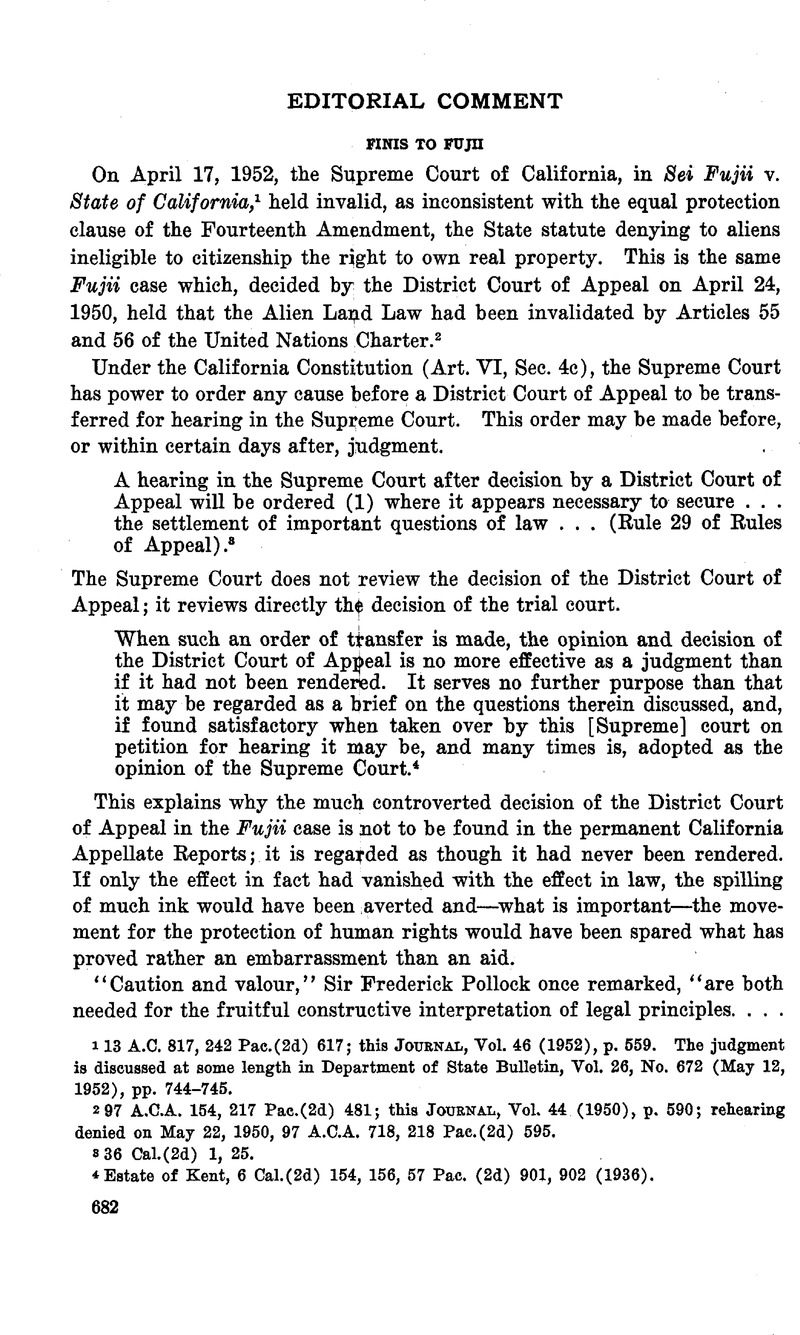Article contents
Abstract

- Type
- Editorial Comment
- Information
- Copyright
- Copyright © American Society of International Law 1952
References
1 13 A.C. 817, 242 Pae.(2d) 617; this Journal, Vol. 46 (1952), p. 559. The judgment is discussed at some length in Department of State Bulletin, Vol. 26, No. 672 (May 12, 1952), pp. 744–745.
2 97 A.C.A. 154, 217 Pac.(2d) 481; this Journal, Vol. 44 (1950), p. 590; rehearing denied on May 22, 1950, 97 A.C.A. 718, 218 Pac.(2d) 595.
3 36 Cal.(2d) 1, 25.
4 Estate of Kent, 6 Cal.(2d) 154, 156, 57 Pac. (2d) 901, 902 (1936).
5 “Judicial Caution and Valour,” 45 Law Quarterly Review (1929) 293, 295, 296.
6 Sec. 738.5 of the Code of Civil Procedure. Action against State concerning escheat.
7 1 Beering’s Gen. Laws (1944), Act 261.
8 Appellant’s Opening Brief, p. 85.
9 Ibid., p. 88.
10 Ibid., p. 91.
11 Perez v. State, 32 Cal.(2d) 711, 198 Pac.(2d) 17 (1948).
12 Civil Code, §§ 60, 69.
13 Statutes of California, 1850, Ch. 140, passed Apr. 22, 1850.
14 332 U. S. 633, 647 at 649–650 (1948); this Journal, Vol. 42 (1948), p. 475.
15 322 U. S. 633, 650 at 673 (1948); this Journal, Vol. 42 (1948), p. 475, at p. 477.
16 Petition for Rehearing, p. 2.
17 The Clerk advises that the appeal was argued on March 22, 1950. The decision was made on April 24.
18 The Los Angeles Daily Journal, Official Paper of the City of and County of Los Angeles. April 25, 1950, p. 1.
19 263 U. S. 197, upholding the Anti-Alien Land Law of Washington; this Journal, Vol. 18 (1924), p. 346.
20 Porterfield v. Webb, 263 U. S. 225, decided on the same day, sustained the California Act. Webb v. O’Brien, 263 U. S. 313 (1923), Prick v. Webb, 263 U. S. 326 (1923), and Cockrill v. California, 268 U. S. 258 (1925), upheld particular provisions of the California Law. Butler, J., spoke for the Court in each case.
21 Notably in Oyama v. California, supra, note 14; and Takahashi v. Fish and Game Commission, 334 U. S. 410 (1948), this Journal, Vol. 42 (1948), p. 934, which struck down as a denial of equal protection a California statute barring the issue of commercial fishing licenses to ineligible aliens.
22 Namba v. McCourt and Neuner, 185 Ore. 579, 204 Pac.(2d) 569 (1949); this Journal, Vol. 44 (1950), p. 199.
23 The Attorney General was satisfied to abide by the State court’s decision, having regard to pertinent recent adjudications in the Supreme Court of the United States. By Ch. 350, Oregon Laws of 1949 the Legislature repealed the Alien Land Law.
24 Recent cases to be noted are Shelley v. Kraemer, 334 U. S. 1 (1948), and Hurd v. Hodge, 334 U. S. 24 (1948), this Journal, Vol. 42 (1948), p. 710, refusing to enforce restrictive covenants; Sweatt v. Painter, 339 U. S. 629 (1950), and McLaurin v. Oklahoma State Regents, 339 U. S. 637 (1950), as to segregation in State universities; as to discrimination in transportation, Henderson v. United States, 339 U. S. 816 (1950); and compare Morgan v. Virginia, 328 U. S. 373 (1946), with Bob-Lo Excursion Co. v. Michigan, 333 U. S. 28 (1948).
25 Brief for Petitioners, p. 11.
26 Ibid., pp. 52–53.
27 Petition for Behearing, p. 2.
28 Ibid., p. 6. The debate may be found in 96 Cong. Rec. 5993–6000. The opinion was reprinted, pp. 6000–6003.
29 Ibid., p. 11.
30 “Charter Provisions on Human Rights in American Law,” this Journal, Vol. 44 (1950), pp. 543–548.
31 97 A.C.A. 718.
32 Answer to Petition for Behearing, p. 13.
33 2 Pet. 253, 314 (1829).
34 The Los Angeles Daily Journal, May 12, 1952, p. 1.
35 I bow to the acute and discriminating comment by Professor Preuss in this Journal, Vol. 46 (1952), pp. 289–296.
36 Recall Chief Justice Marshall’s note to Justice Story, after the monumental decision in McCulloch v. Maryland, 4 Wheat. 316 (1819): “Our opinion in the Bank Case has aroused the sleeping spirit of Virginia, if indeed it ever sleeps. It will, I understand, be attacked in the papers with some asperity, and as those who favor it never write for the publick it will remain undefended & of course be considered as damnably heretical.” 4 Beveridge, Life of John Marshall, 312. ; That great case is here compared with a small one to make this point: that when a court asserts the authority of a new and larger organization, already the object of jealous concern, it should take care, as did Marshall and his brethren, to be right.
37 Screws v. U. S., 325 U. S. 91 (1945); Collins v. Hardyman, 341 U. S. 651 (1951).
- 2
- Cited by


